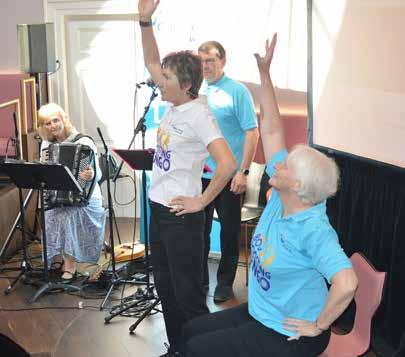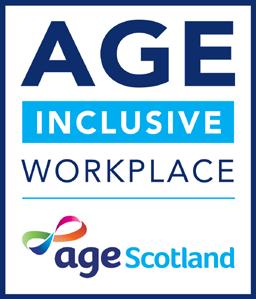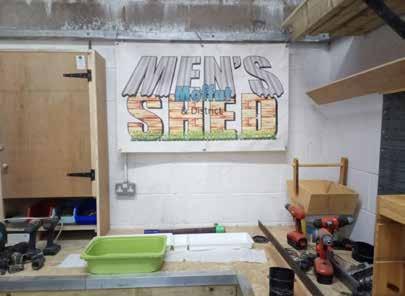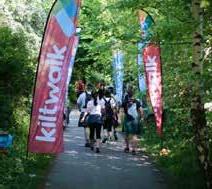
12 minute read
How our friendship line has helped tackle loneliness
Extending the hand of friendship
When the Covid-19 restrictions first came into place a year ago, we scaled up our helpline to cope with the surge in demand for information, advice and practical help. But after the initial wave of calls about accessing food shopping or advice about shielding settled down, it became apparent that the nature of the calls was changing and that growing numbers of older people were feeling increasingly lonely and isolated. Our Age Scotland friendship line was launched last May in response to the phenomenon of ‘lockdown loneliness’. Since it began, the hand of friendship has been extended to hundreds of older people in need of a friendly ear to listen and a blether. Some of the callers have shared heartbreaking stories. “I haven’t spoken to another person in a week,” one told us. Another said that shielding during lockdown left them feeling that “life wasn’t worth living”. Caller Violet, 79, said: “I gave the Age Scotland friendship line a call during lockdown when I was feeling a bit lonely, just to find out what it was. “I had been shielding because I have COPD and hadn’t been able to see my friends or even go to the shops. I was feeling a bit cut off. “The girl I spoke to was very nice. We had a good blether. It was a lovely thing to do. I can talk about anything and it’s always a wee treat to get the call on a Tuesday morning.” And Peter, 81, said: “It has been a lifeline for me. I look forward to my weekly chats with volunteers.” As most of Scotland entered a new lockdown in January, we faced the likelihood of a fresh surge of loneliness among older people. Unlike last March when at least spring was on the way with the promise of better weather, in January we faced dark days and icy pavements – making it hazardous for older people to get outside for fresh air and exercise. Once again the friendship line was on hand to support older people with comfort, reassurance and friendship. It was also heartening to see communities come together to look out for older people. From delivering Friday night fish suppers in the Highlands to afternoon teas in the Borders, friends, neighbours and volunteers found ways to brighten someone’s day. There’s no doubt this has been a lonely and difficult 12 months for many. It has increased isolation among hundreds of thousands of older people across Scotland. But remember we are here for you – just pick up the phone. We look forward to hearing from you.
Advertisement
for me during these months. I've been looking forward to my weekly chats with volunteers."
Our friendship line is open Monday to Friday, 9am to 5pm and is free to call on 0800 12 44 222.
A guide to applying for EU Settled Status

Now that the UK has now left the European Union, all EU citizens living in the UK must apply to the EU Settlement Scheme by 30 June to continue living here and accessing services, including the NHS. We are concerned that many older EU citizens living in Scotland might not have applied yet or faced difficulty over the past year doing so, either because they don’t use the internet or have been unable to access the face-to-face support they need. If this applies to you or a family member, we’ve produced a summary of what you need to do and where to find help.
Who should apply?
If you are originally from a country in the EU, European Economic Area or Switzerland you must apply – even if you already have a permanent residence document or have lived in the UK for a long time. Any family members who are not UK citizens must also apply. You don’t need to apply if you have Irish citizenship or indefinite leave to remain.
Settled and pre-settled status
You can make a free application to the EU Settlement Scheme for settled (if you’ve been resident in the UK for at least five continuous years) or pre-settled (if you’ve been resident in the UK for less than five years) status. From 1 July, you’ll need settled / pre-settled status to: • Stay in the UK for more than three months • Work or study • Vote • Use the NHS • Claim State Pension and benefits • Rent a home or get help with housing from your council
Post-Brexit all EU citizens have to apply to remain in the UK
How to apply
Most people will need to apply online: www.gov.uk/settled-status-eu-citizens-families You will need documents to prove your identity, your national insurance number or proof of how long you have been in the UK, as well as an email address and mobile phone number. If you don’t have your passport or national identity card, you can’t apply online and will need to request a paper form from the EU Settlement Resolution Centre by calling 0300 123 7379 (Monday to Friday, 8am to 8pm; Saturday & Sunday, 9.30am to 4.30pm)
Where to find help
If you have questions or need help applying, call Citizens Advice Scotland’s EU Citizens Support Service for free on 0800 916 9847 (Mon - Fri, 9am - 5pm). You can find out more at www.cas.org.uk/brexit. The Scottish Government has produced a toolkit, which includes translations of information leafets: www.gov.scot/publications/eu-citizens-stayingin-scotland-package-of-support.
You have until 30 June to apply for settled status. Visit www.mygov.scot/eu-exit-citizens for further information.
and lighten Stand tall the load

Poor posture puts strain on the spine. In neutral position a head weighs around 12lbs.
Age Scotland health professional Yolanda Strachan shares the benefits of good posture and how it can improve our overall health and wellbeing. In our Around the House in 80 Days YouTube series, we place a huge emphasis on trying to improve your posture little by little. You’ll hear us say: “If you focus on nothing else, focus on your posture, and breathe!” Posture affects the length and stability of our stride, how confidently we can walk and move. It is also important for our brains. Sitting or standing in a slouched posture reduces our lung capacity by 30%. Posture affects our energy and our mood. Mechanically our body works as an inverted pendulum. We are top heavy and when we are out of alignment, our backs and our breathing suffer. In neutral position our head weighs on average 12lbs. Move your head slightly forward out of alignment and it suddenly weighs 32lbs and with pronounced curve in upper spine our head weighs a massive 42lbs! That’s a lot of extra strain on our spine. Our posture whether sitting or standing is the one thing that we can all adjust in order to benefit our backs, our core and our ability to move all of our limbs freely and securely. Good posture is a feeling. A wonderful feeling of driving up from your feet, of lifting up out of your hips, of lengthening in your back no matter how curved, of lifting through your front and seeing the world head on.
Sore lower back? You may need to focus on your breathing!
Did you know that people who breath into their upper chest only, often experience very sore lower backs? Abdominal breathing is where your breath goes all the way down into your lower lungs, allowing your diaphragm to expand outwards. When you think of your diaphragm you probably think of it as something that helps you breathe but it is actually one of your major back muscles. It is integral in supporting the joints and discs of the back and keeps your spinal column upright and stable. With good posture we make room to breathe more easily and if we move and breathe correctly our centre of gravity lowers. This corrects our tendency to top heaviness.
Interesting fact about crocodiles
In humans our diaphragms are vertical and act like a piston. It lets us stand up and stay stable for limb and head movement. Crocodiles by contrast have horizontal diaphragms allowing them to shoot forward – much more suited to their needs! So for anyone who thinks it is too late to do anything about their posture, start by focusing on your breathing. You will automatically drive yourself skyward and you will feel a million dollars.
Visit the Age Scotland YouTube channel to watch our Around the House videos - gentle, accessible exercises to improve your posture.
At the end of last year our health professionals, Jenny and Yolanda, developed Around the House in 80 Days – a series of movement videos to help counter the impact of lockdown and shielding among older people. They posted the videos on YouTube throughout November, with a view to encouraging people to move more. But how did two self-confessed YouTube novices turn themselves into film-makers and presenters? Jenny Ackland takes us behind the scenes to a world of inquisitive pets and discarded loo brushes. We tackled this project with our usual enthusiasm. Lack of any filming experience didn’t stop us even though we had to do the filming ourselves, in our own homes using our mobile phones. At that point we were in blissful ignorance about the huge number of pitfalls that would befall us so we carried on regardless. First thing was to get stuck into the cleaning - we didn’t want red faces about our domestic failings. Wipes, polish, sprays - you name it! Everything was given a good once over. We moved our ‘stuff’ into unseen corners to try and create a bit of space to show the movements. If you had turned the camera round, the genuine state of our houses would have been a real eye opener! Positioning the camera correctly was a bit of a trial too. We would try balancing the tripod in so many different places - in the sink, on top of wardrobes, boxes - anything to try and get our whole bodies in a shot. The tripod would sometimes overbalance and land on the foor or in the bath on one occasion - good job it was empty! Interruptions were frequent and mainly of the animal variety. Yolanda’s dogs Tilly and Hector and cats Rudi and Rolo all wanted their five minutes of fame.

Jenny and Yolanda before they became YouTubers
Fireworks would sometimes be going off outside and make you jump or a lorry would pass by just when you thought you had managed to get a good take - and then had to do it all over again. You will notice in the films that we used a variety of props to encourage people to do some of the movements in a particular room, for example cleaning the loo. Originally we used an actual loo brush (a clean one, of course) however in the final takes we used a wooden spoon after being rightly advised that waving a loo brush around might not seem very hygienic. Despite all the trials and hazards, we had great fun making the films and hope this article gives you some insight into what happened behind the scenes.
Till y & Hector
A selection of the Around the House in 80 Days videos are now available on DVD. Email info@agescotland.org.uk or call 0333 323 2400 for a free copy.
highlights importance Covid impact of age inclusive workshops

The number of unemployed people aged over 50 in the UK has increased by a third in the past year according to recent analysis of data from the Office for National Statistics by Rest Less, an online site for over 50s. The figures show there are 91,000 more unemployed older people in the UK than there were 12 months ago. This is the largest increase in unemployment of all age groups and highlights that older workers have been disproportionately affected by Covid. The impact of unemployment in the over 50s can have a detrimental effect on financial wellbeing in later life. In delivering our pre-retirement Planning For Your Future workshops to almost 3,000 workers, Age Scotland has found that people often don’t think about future finances until nearer retirement. Unemployment or a change in working circumstances at this time can significantly affect retirement plans. These figures highlight the need for workplaces to be as age-inclusive as possible, ensuring that any age-related biases are recognised and addressed and helping workers to plan for later life as early as possible. Despite the many challenges posed by Covid-19 over the past 12 months, we have been able to continue supporting older workers through age inclusive workplace workshops. The quick move from office-based to home working (for those that were able to work remotely) posed an initial challenge as our face-to-face workshops were no longer possible. However, the team worked quickly to adapt the sessions and before long virtual Planning For Your Future, Age Inclusion and Dementia Awareness workshops were being delivered online to almost 1,000 employees over the course of the year. Dementia awareness training has been particularly well attended as organisations understand the growing need to support staff and customers affected by dementia. We were delighted when our workshops were recently awarded Continuing Professional Development (CPD) accreditation meaning that the content has been recognised as contributing towards the ongoing learning and development of workers in a number of roles where an understanding of dementia is vital. As an employer itself, Age Scotland strives to be as age-inclusive as possible having recently completed our own Age Inclusive Matrix programme - an exercise that helps organisations to identify key ways in which it can support employees of all ages to deliver to their full potential. Amongst other initiatives, we have started the process of becoming a Carer Positive organisation to better support staff who have caring responsibilities. The past 12 months have proved to be a challenging time for many. By helping workplaces to be as age-friendly as possible Age Scotland can further support older workers and their families through the pandemic and beyond.
Find out more at www.age.scot/age-inclusive-workplace





